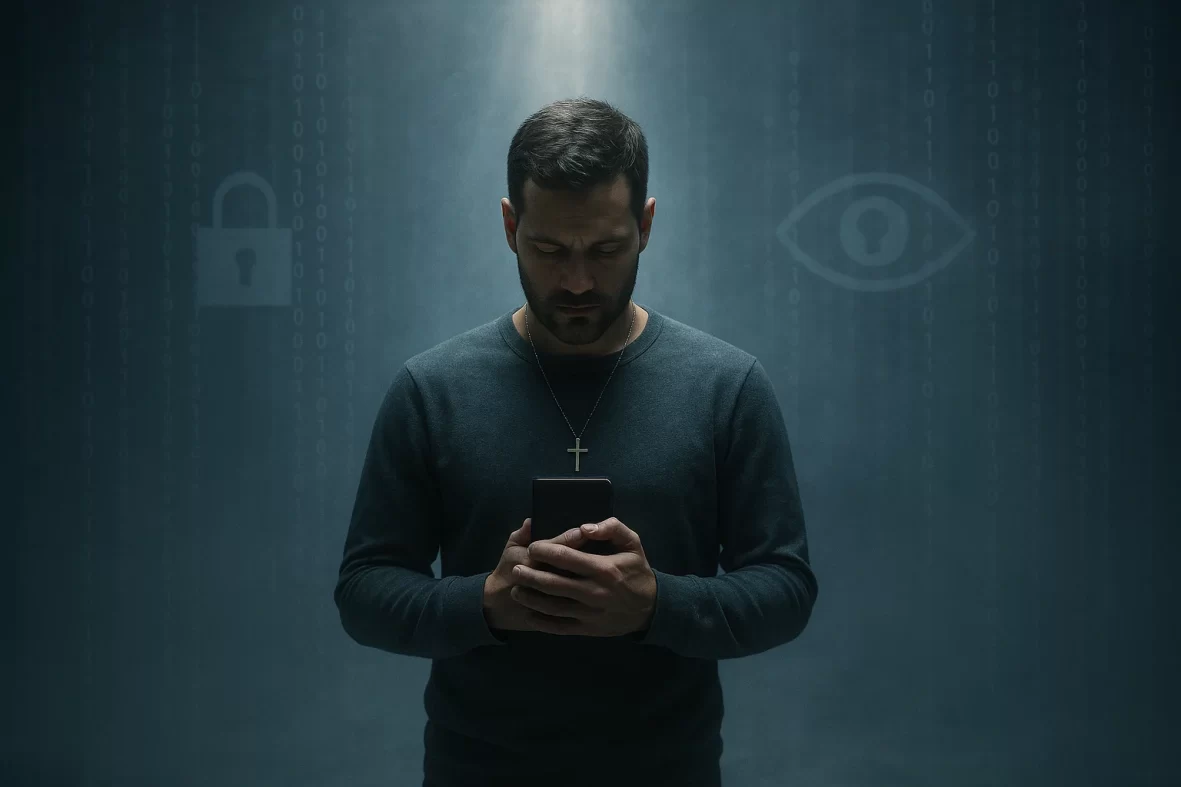Series: Technology and Ethics: A Biblical Worldview for the Digital Age
Scripture Focus: Philippians 4:8
Theme: Fall
The Algorithm Knows You Better Than Your Pastor
She didn’t tell anyone. Not yet. Not her husband. Not even her doctor. But the ad said it all.
Scrolling her phone at the kitchen table, she paused—blinking at a sponsored banner: “Expecting soon? Here’s what every new mom should know.” It was a pregnancy test ad, pushed by an algorithm that had noticed subtle changes: her late-night browsing, certain purchase patterns, a shift in her sleep habits tracked by her smart watch.
She hadn’t missed her period. She hadn’t taken a test. But the machine had made a prediction—and it was right.
That real story, reported in The New York Times, raises a haunting question for every believer:
When does innovation cross the line into intrusion?
In a digital age where technology knows our routines, manipulates our choices, and blurs the line between truth and spin, Christians can’t afford to be naïve. We are called to be people of truth, to honor the dignity of others, and to steward information as a sacred trust, not just a commodity.
Because behind every click, there’s a person. And behind every algorithm, there’s an ethic.
What Does the Bible Say?
Finally, brothers, whatever is true, whatever is dignified, whatever is right… dwell on these things. —Philippians 4:8
Paul’s exhortation to the Philippians reads like a filter for our digital age. What do you dwell on when you scroll? What do you amplify with your retweets? What do you expose when you post? Behind the glowing screen lies a battlefield for truth, justice, and spiritual integrity.
Let’s examine three key biblical pillars for ethics in the digital age:
1. Truthfulness Reflects God’s Nature
God is not only the source of truth—He is truth (John 14:6). Falsehood, in any form, distorts His image. The Book of Proverbs is clear:
Lying lips are an abomination to Yahweh, but those who deal faithfully are His delight Proverbs 12:22.
In an age of deepfakes and digital deception, we must be radical truth-tellers—not sharers of spin.
2. Privacy Honors Human Dignity
From the moment Adam and Eve covered themselves (Gen. 3:7), Scripture has acknowledged the need for boundaries. Privacy is not paranoia—it’s a form of modesty and personhood.
Paul exhorts believers to “make it your ambition to lead a quiet life… and attend to your own business” (1 Thess. 4:11–12).
Surveillance capitalism—where every movement, search, or purchase is tracked—violates this biblical modesty.
3. Information Is a Stewardship, Not a Weapon
Biblically, knowledge is power—and those in power are held accountable (Luke 12:48). Ezekiel rebukes the shepherds of Israel for exploiting their flock (Ezek. 34). Today, we must ask:
Are we using technology to serve others, or to manipulate them?
Christian personalism affirms that people are not data points—they are image-bearers of God. Ethics must begin there.
The Digital Dilemmas We Face
Let’s name the beasts in the shadows. The Fall has corrupted not only human hearts but digital tools:
- Misinformation: Lies travel faster than truth, especially when they’re click-worthy.
- Surveillance capitalism: Companies monetize your habits, selling predictions of your behavior for profit (Zuboff, 2019).
- Algorithmic injustice: AI tools often reinforce societal bias because they’re trained on broken data.
- Data exploitation: Your attention has a price tag. And if you’re not paying for the product, you probably are the product.
In this world of digital manipulation, Christians must be the clearest voices of truth—and the fiercest defenders of privacy.
“God sees in secret—not so He can exploit, but so He can redeem.”
Walking Wisely: Digital Discipleship
This isn’t just about tech policy. It’s about spiritual formation. Here’s how we live wisely in a world wired for compromise:
- Verify before you share. Truth is never optional—even when it’s trending.
- Model confession over curation. Integrity is better than image.
- Teach digital modesty. Talk to your children about boundaries, privacy, and value apart from performance.
- Discern your digital diet. If the tool shapes your heart more than Scripture does, it’s time to unplug.
- Ask: “Who is being served?” Does this platform serve your growth—or someone else’s greed?
As James K. A. Smith reminds us, you are what you love—and what you repeatedly click (Smith, 2016).
A Call to Courageous Integrity
Digital discipleship means more than screen time limits. It’s a way of life marked by love, truth, and integrity.
- Speak truth—even when it costs you followers.
- Guard privacy—both your own and your neighbor’s.
- Use tools with wisdom—don’t serve what should serve you.
Christian ethics demands more than convenience. It demands conviction.
Series Navigation
← Previous: Social Media and the Gospel
→ Next: The Techno-Future
View all: Technology and Ethics Series Page
Key Takeaways
- God cares about what you see, share, and store—because truth and dignity matter.
- Christian ethics in the digital age require vigilance, integrity, and courage.
- Your clicks, shares, and searches are spiritual decisions—steward them wisely.
Live it out. Share the truth. Walk with courage.
References
Kessler, D. (2021). Digital Privacy and Christian Ethics. Journal of Biblical Ethics, 12(3), 122–139.
Ott, K. (2022). Christian Ethics for a Digital Society. Fortress Press.
Reinke, T. (2022). God, Technology, and the Christian Life. Crossway.
Smith, J. K. A. (2016). You Are What You Love: The Spiritual Power of Habit. Brazos Press.
Thacker, J. (2020). The Digital Public Square: Christian Ethics in a Technological Society. B&H Academic.
Waters, B. (2006). From Human to Posthuman: Christian Theology and Technology in a Postmodern World. Ashgate.
Zuboff, S. (2019). The Age of Surveillance Capitalism: The Fight for a Human Future at the New Frontier of Power. PublicAffairs.








